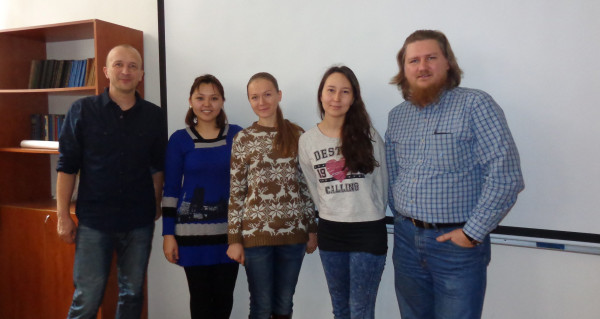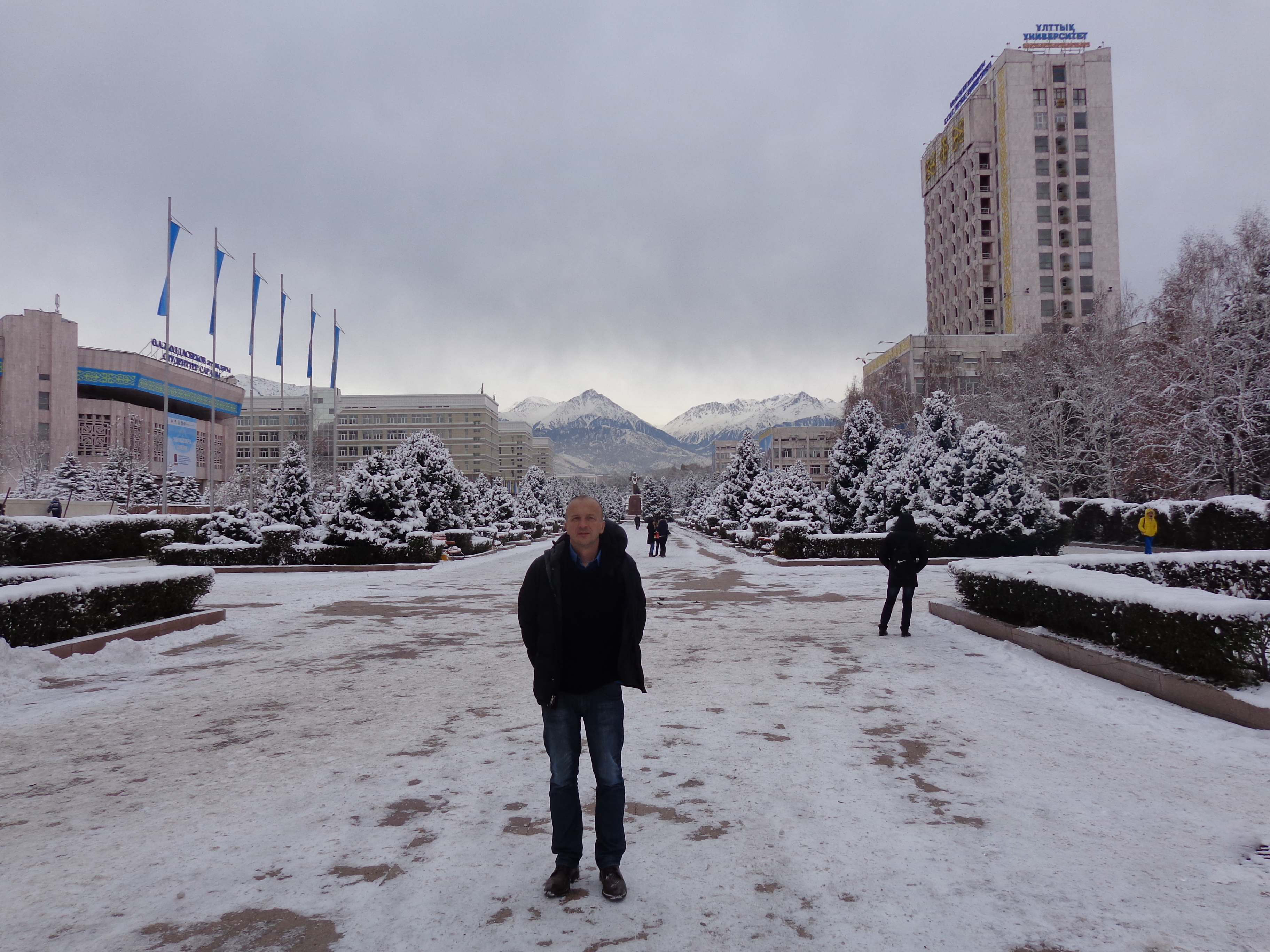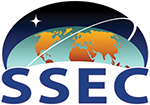Remote-sensing bootcamp fosters international collaboration

SSEC scientists Andi Walther (far left) and Denis Botambekov (far right) with three of their pupils at al-Farabi Kazakhstan National University. Credit: Denis Botambekov, CIMSS.
A two-week bootcamp led by Space Science and Engineering Center (SSEC) scientists in Almaty, Kazakhstan, last autumn promises to spark new collaborations with some of the nation’s top atmospheric and meteorological researchers.
Andi Walther and Denis Botambekov, research associates with the NOAA Algorithm Working Group for cloud remote sensing at the Cooperative Institute for Meteorological Satellite Studies (CIMSS), were invited by Botambekov’s alma mater, al-Farabi Kazakhstan National University, to lead the bootcamp. They instructed a group of about 15 master’s students, all of whom are studying in fields related to remote sensing and meteorology.
The bootcamp was part of a special program that the university organizes each year, inviting professors and researchers from overseas to share their expertise and teaching methods, this time, on the fundamentals of satellite remote sensing
“The goal is to promote international cooperation,” Walther said, adding that the exchange of expertise was two-sided. “While we were there, we talked to different professors about what they are doing, scientifically, to benefit from their experience.”
For the final two weeks in November 2014, the pair co-taught labs, seminars, and lectures for four hours each day. Some of the activities mirrored coursework that would be taught at UW-Madison, as CIMSS Director Steve Ackerman, a professor in the Department of Atmospheric and Oceanic Sciences, and other SSEC scientists supplied data bundles and materials.
For example, in one lab exercise, students installed SSEC’s Man-computer Interactive Data Access System (McIDAS) and were given hands-on tasks to complete similar to those in one of Ackerman’s 400-level satellite meteorology courses.
These were geared toward teaching students how to:
- create different RGB images from the imager sensors, which help to detect objects such as clouds, dust, smoke, and fire
- use and interpret microwave sensor data
- use and analyze infrared sounder multi-spectral displays
- understand the relationships between atmospheric absorption, scattering, cloudiness, and weighting functions
- compare data from multiple sensors (AMSR-E, MODIS, and CloudSat radar) to understand their advantages and disadvantages
Botambekov, who had participated in a similar bootcamp held at CIMSS last year, said this experience was designed to be more work-intensive. And, although most students knew some English, language differences presented an additional obstacle.
“It was a little tough,” Botambekov said, explaining that he acted as an interpreter for the class from time to time. “A lot of scientific words carry over, but sometimes it’s not a direct translation. We had to use some kind of combination to explain the concepts.”

SSEC scientist Andi Walther in Kazakhstan for a two-week remote sensing bootcamp. Credit: Denis Botambekov, CIMSS.
The group included first-year and second-year graduate students from the university’s departments of Meteorology and Hydrology. Walther said they took an individualized approach, tailoring the content to each student’s background and knowledge base.
“We didn’t know how advanced the students would be,” he said. “We had to be a little bit flexible, and see what they can do.”
In addition to classroom time, the two scientists gave a presentation on SSEC, CIMSS, and the Community Satellite Processing Package (CSPP), addressing an audience of students, professors, and Kazakhstan Space Research Institute scientists, as well as representatives from Kazakhstan’s national weather service, KazHydroMet.
For some, it was their first exposure to free, open-source data-processing software.
“One of our goals was to spread the word about what is available with CSPP,” Botambekov said. “Many people were surprised, and very excited, to learn that so many data are available for free.”
Svetlana Polyakova, a researcher at al-Farabi Kazakhstan National University who initiated SSEC’s involvement in the bootcamp, recently won a national teaching award that will grant funding for her to travel outside the country as a visiting scholar. Ackerman wrote her a letter of invitation that, if approved, will allow her to study temporarily at SSEC.
“We hope this will allow us to exchange information, and for her to learn, in person, what we do here at SSEC,” Botambekov said.
Botambekov and Walther hope to continue the knowledge exchange with university students and faculty in Kazakhstan through upcoming programs.
by Sarah Witman
